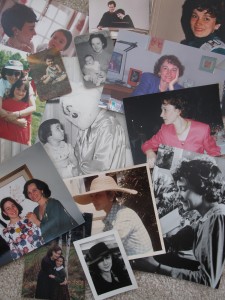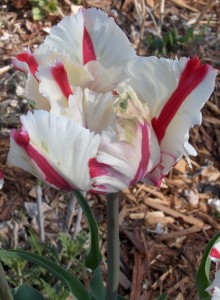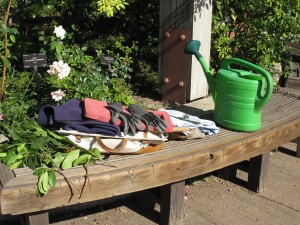In the Christian church, Lent began on Ash Wednesday (February 18). Although penitence and penance (words most of us have come to hate without really understanding what they mean) have long been associated with Lent, it would be less emotionally laden to describe this season as one of intentional metanoia: a season about turning toward wholeness, toward center, toward renewing and abundant life. But before we abandon them completely, I would like to reclaim those good words penance (which is a word about relinquishing) and penitence (which is a word about acknowledging responsibility). Just breathe with me here.
Let me begin by assuming that I am not alone in allowing my priorities to tilt off center from time to time. I suspect I am not alone in getting co-opted by the fool’s gold of bright, shiny, cultural values that are good for the economy, but lead to unhealthy addictions. I am, perhaps, not alone in ever-so-occasionally making a mistake, or doing something I regret, or knowingly saying something that hurts another being. Unfortunately, when I am not paying attention or pausing for some reflection and self-assessment, “once in awhile” and “occasionally” can morph into “frequently” and “habitually”. And let’s be real: we talk about mindfulness so much because, unless we are Buddhist monks or members of contemplative Christian religious communities (most of whom are not sitting in front of a computer reading this blog), we tend toward being unmindful.
Lent is forty days (seven weeks not counting Sundays) set aside for deliberate attentiveness to relinquishing those unhealthy behaviors that are morphing into habits so that we can have the time and energy to engage in the healthy behaviors that lead to energized and grace-filled life. Lent is about spring cleaning our souls and getting the unproductive bits onto the compost heap where they can decompose into rich nutrients to nurture strong growth. We are well aware that not everything we have ever done or said or written or felt is worth saving or repeating (see Tidying Up). Not every last scrap of it is life-giving or life-affirming…some of it (see previous paragraph) is downright unkind or unwise or seriously broken.
If you are a participating member of a Christian congregation, you are likely being reminded more than once a week that we are back in that annual heart-space of claiming our agency to turn toward health. But even if you don’t call yourself Christian or engage in communal spiritual practices, you can piggy-back on the fact that some of your friends or neighbors are (presumably) being especially aware of old stuff and new possibilities…and you can know that you have companions for your own thoughtful reflection.
It can be helpful, I think, to step away from the superficial self-judgments and remember that this process is not about beating our breast over remembered sins (that word, by the way, simply refers to those behaviors and thoughts and practices that sunder or separate us from G-d, our neighbor, our beloved universe, and our truest selves). Beating one’s breast actually does nothing but lead to a sore breast and, if done hard enough, a bruise. The purpose of accepting responsibility and relinquishing unwise behavior (of penitence and penance) is transformation from pain, or suffering, or despair, or any other unhealth to freedom, abundance, grace, and joy. We need to keep our eyes on the blessings – that is what we are choosing, after all.
Relinquishing is a form of composting. We give up those aspects of self that are chaff rather than grain, stems and thorns rather than flowers or fruit, dead roots and stalks that have served their purpose, and the weeds that have been growing while we weren’t checking up routinely, and we add them to the scraps and bits from last year and the year before that, be sure it is all turned over, and let nature do its magic. In the process, we need to be willing to give up old identities and roles, old personas that may have served us well at one time, so that we can be invested in what is now rather than in what was then.
 Just so you know, I am not particularly deft at this. Which is odd because it isn’t as if I haven’t had plenty of opportunity to practice. Yet, if I look back at my life I can say that, without fail, clinging to old identities led me unwaveringly to misery and despair. To the place where the pain of not changing, not relinquishing, was so extreme that anything seemed better. So, you would think that once (or maybe twice) through that experience would have taught me to do it differently the next time. You’d be wrong. I am highly skilled at clinging myself into that misery and despair place because I become deeply attached to my choices, and the idea of voluntarily giving up something I value (my “me”, in this case) is not happifying – if I can borrow the Shaker term. The image of composting lets me lean into the process because, as a gardener, I know that good compost is priceless; so adding something to the compost pile is not like throwing it away. I am still not particularly deft, but I am defter than I was.
Just so you know, I am not particularly deft at this. Which is odd because it isn’t as if I haven’t had plenty of opportunity to practice. Yet, if I look back at my life I can say that, without fail, clinging to old identities led me unwaveringly to misery and despair. To the place where the pain of not changing, not relinquishing, was so extreme that anything seemed better. So, you would think that once (or maybe twice) through that experience would have taught me to do it differently the next time. You’d be wrong. I am highly skilled at clinging myself into that misery and despair place because I become deeply attached to my choices, and the idea of voluntarily giving up something I value (my “me”, in this case) is not happifying – if I can borrow the Shaker term. The image of composting lets me lean into the process because, as a gardener, I know that good compost is priceless; so adding something to the compost pile is not like throwing it away. I am still not particularly deft, but I am defter than I was.
So, Lent is a kind of mini-salvation every year. It is a reminder that I can choose a different road…and now would be a good time to do that. It is a reminder that if I want to grow anything abundant, a couple of buckets of compost are one of the best tools at my disposal. It is a reminder that I am standing tiptoe ready at the edge of a new growing season and those seeds I’ve been wanting to grow may just be the right ones for this time and place.
I invite you to join me in gathering up some of the past growth of former lives, and relinquishing it in time for it to become nutrient-rich undergirding for what is to blossom this year.
 Re-creating Beloved,
Re-creating Beloved,
untangle the knots of self-possession
until I unfold freely
dispossessed,
limitless, boundless,
warmed into release
dis-integrated into possibility.
–Andrea
Text © 2015, Andrea La Sonde Anastos
Photos ©2014 and 2015 Immram Chara, LLC
